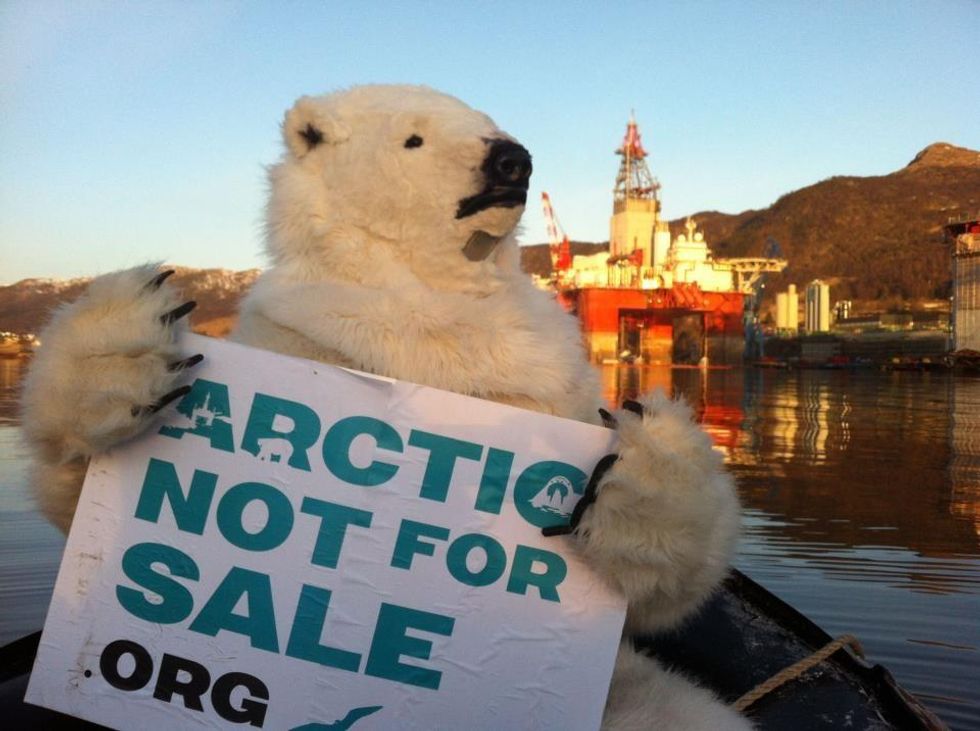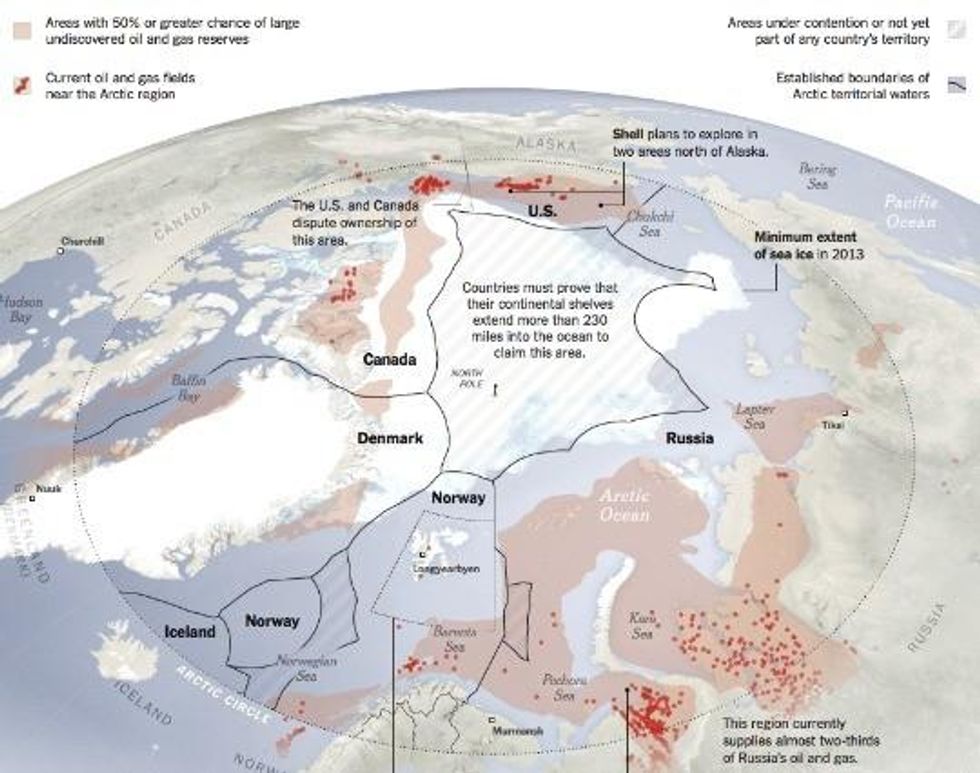

SUBSCRIBE TO OUR FREE NEWSLETTER
Daily news & progressive opinion—funded by the people, not the corporations—delivered straight to your inbox.
5
#000000
#FFFFFF
To donate by check, phone, or other method, see our More Ways to Give page.


Daily news & progressive opinion—funded by the people, not the corporations—delivered straight to your inbox.

Ahead of plans to make an official submission to the UN Commission on the Limits of the Continental Shelf, Canadian Foreign Affairs Minister John Baird said Monday that the country had enlisted scientists to prove that "the full extent of the continental shelf in the Arctic includes Canada's claim to the North Pole," as well as territory in both the Atlantic and Arctic seabeds beyond the 200-nautical-mile Exclusive Economic Zone, CBC reports.
Laying claim on the North Pole, which has yet to be claimed by any country, would extend Canada's ownership of natural resources in the area.
The bid comes as Arctic-bordering nations race to establish gas and oil drilling in the region, greenlighting what environmental groups call reckless operations that risk spoiling the pristine Arctic ecosystem. Rapidly melting ice has also opened up new shipping channels through the Arctic which neighboring countries have been eager to exploit.
Responding to Canada's pronouncement, Russian president Vladimir Putin ordered his defense chiefs to "concentrate on building up infrastructure and military units in the Arctic," including the restoration of a number of Soviet-era Arctic bases, the Guardian reports. Putin said the move is crucial to protecting Russia's "national and strategic interests."
The Guardian continues:
Some experts have described Canada's audacious claim to the north pole as a long shot. This week Baird said it would take several years for Canada to map the continental shelf and to complete its full UN submission. "We are determined to ensure that all Canadians benefit from the tremendous resources that are to be found in Canada's far north," he said.
Arctic drilling, by any nation, "will take us into a climate maelstrom," warned Greenpeace Canada Arctic Campaigner Farrah Khan. "Extending the Canadian territory to expand Arctic oil extraction is equal to condemning future generations to an environmental nightmare," Khan added in a statement following Canada's announcement.
Canada's official submission to the UN body is due this month. Last week, Canada applied to increase its nautical borders by roughly 1.2m square kilometers beyond the current boundary, 200 nautical miles from the northern coast, which is allotted to all neighboring Arctic nations including Canada, Denmark, Norway, Russia and the U.S..
Over the weekend the New York Times published this map of current Arctic boundaries as well as documented reserves of fossil fuels:

_____________________
Political revenge. Mass deportations. Project 2025. Unfathomable corruption. Attacks on Social Security, Medicare, and Medicaid. Pardons for insurrectionists. An all-out assault on democracy. Republicans in Congress are scrambling to give Trump broad new powers to strip the tax-exempt status of any nonprofit he doesn’t like by declaring it a “terrorist-supporting organization.” Trump has already begun filing lawsuits against news outlets that criticize him. At Common Dreams, we won’t back down, but we must get ready for whatever Trump and his thugs throw at us. Our Year-End campaign is our most important fundraiser of the year. As a people-powered nonprofit news outlet, we cover issues the corporate media never will, but we can only continue with our readers’ support. By donating today, please help us fight the dangers of a second Trump presidency. |

Ahead of plans to make an official submission to the UN Commission on the Limits of the Continental Shelf, Canadian Foreign Affairs Minister John Baird said Monday that the country had enlisted scientists to prove that "the full extent of the continental shelf in the Arctic includes Canada's claim to the North Pole," as well as territory in both the Atlantic and Arctic seabeds beyond the 200-nautical-mile Exclusive Economic Zone, CBC reports.
Laying claim on the North Pole, which has yet to be claimed by any country, would extend Canada's ownership of natural resources in the area.
The bid comes as Arctic-bordering nations race to establish gas and oil drilling in the region, greenlighting what environmental groups call reckless operations that risk spoiling the pristine Arctic ecosystem. Rapidly melting ice has also opened up new shipping channels through the Arctic which neighboring countries have been eager to exploit.
Responding to Canada's pronouncement, Russian president Vladimir Putin ordered his defense chiefs to "concentrate on building up infrastructure and military units in the Arctic," including the restoration of a number of Soviet-era Arctic bases, the Guardian reports. Putin said the move is crucial to protecting Russia's "national and strategic interests."
The Guardian continues:
Some experts have described Canada's audacious claim to the north pole as a long shot. This week Baird said it would take several years for Canada to map the continental shelf and to complete its full UN submission. "We are determined to ensure that all Canadians benefit from the tremendous resources that are to be found in Canada's far north," he said.
Arctic drilling, by any nation, "will take us into a climate maelstrom," warned Greenpeace Canada Arctic Campaigner Farrah Khan. "Extending the Canadian territory to expand Arctic oil extraction is equal to condemning future generations to an environmental nightmare," Khan added in a statement following Canada's announcement.
Canada's official submission to the UN body is due this month. Last week, Canada applied to increase its nautical borders by roughly 1.2m square kilometers beyond the current boundary, 200 nautical miles from the northern coast, which is allotted to all neighboring Arctic nations including Canada, Denmark, Norway, Russia and the U.S..
Over the weekend the New York Times published this map of current Arctic boundaries as well as documented reserves of fossil fuels:

_____________________

Ahead of plans to make an official submission to the UN Commission on the Limits of the Continental Shelf, Canadian Foreign Affairs Minister John Baird said Monday that the country had enlisted scientists to prove that "the full extent of the continental shelf in the Arctic includes Canada's claim to the North Pole," as well as territory in both the Atlantic and Arctic seabeds beyond the 200-nautical-mile Exclusive Economic Zone, CBC reports.
Laying claim on the North Pole, which has yet to be claimed by any country, would extend Canada's ownership of natural resources in the area.
The bid comes as Arctic-bordering nations race to establish gas and oil drilling in the region, greenlighting what environmental groups call reckless operations that risk spoiling the pristine Arctic ecosystem. Rapidly melting ice has also opened up new shipping channels through the Arctic which neighboring countries have been eager to exploit.
Responding to Canada's pronouncement, Russian president Vladimir Putin ordered his defense chiefs to "concentrate on building up infrastructure and military units in the Arctic," including the restoration of a number of Soviet-era Arctic bases, the Guardian reports. Putin said the move is crucial to protecting Russia's "national and strategic interests."
The Guardian continues:
Some experts have described Canada's audacious claim to the north pole as a long shot. This week Baird said it would take several years for Canada to map the continental shelf and to complete its full UN submission. "We are determined to ensure that all Canadians benefit from the tremendous resources that are to be found in Canada's far north," he said.
Arctic drilling, by any nation, "will take us into a climate maelstrom," warned Greenpeace Canada Arctic Campaigner Farrah Khan. "Extending the Canadian territory to expand Arctic oil extraction is equal to condemning future generations to an environmental nightmare," Khan added in a statement following Canada's announcement.
Canada's official submission to the UN body is due this month. Last week, Canada applied to increase its nautical borders by roughly 1.2m square kilometers beyond the current boundary, 200 nautical miles from the northern coast, which is allotted to all neighboring Arctic nations including Canada, Denmark, Norway, Russia and the U.S..
Over the weekend the New York Times published this map of current Arctic boundaries as well as documented reserves of fossil fuels:

_____________________